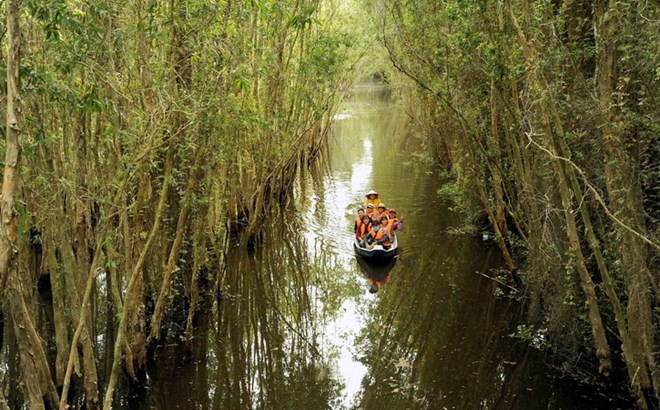
Deputy Minister of Natural Resources and Environment Le Cong Thanh has underlined the need to focus on the planning and investigation of water resources across the country, especially in the Mekong Delta region.
A mangrove forest in Long
An (Photo: VNA)
Speaking at a recent meeting
in Hanoi, the
official proposed amending and supplementing the Law on Water Resources from 2020 in order to improve
the management of sustainable exploitation and use of water resources.
Hoang Van Bay, head of the Department of Water Resources Management, said his
department has prioritised the inspection of the operation of reservoirs, the
planning of basic investigation of water resources nationwide, the building of
a surface and underground water monitoring and managing system, and the listing
of cross-border and inter-provincial water resources.
In 2019, the department will review the implementation of the Law on Water
Resources in 2012 in
preparation for the programme on building, amending, and supplementing the Law
on Water Resources from 2020, while setting forth technical regulations in the
sector.
Nguyen Xuan Truong, head of the Department of Planning and Finance under the
Ministry of Natural Resources and Environment, said it needs to put into
consideration a number of tasks and sectors, especially those regarding the
amendment and supplementation of the 2012 Law on Water Resources.
Another task is to detail the items of planning schemes relating to rivers and
budget, he added.
The Vietnam National Mekong River Commission (VNMRC) will begin to perform its
functions and tasks as a commission for the Mekong,
Sesan, and Srepok river basins in 2019, according to Le DucTrung, chief of the
VNMRC office.
The commission will also investigate, collect, and update data on water
resource exploitation and use it to make plans to improve the environment in
the Mekong River Basin and the socio-economic
conditions of the Mekong Delta.
At the same time, it will continue to coordinate with member countries of the
Mekong River Commission (MRC) to realise the joint statement on providing
consultations for the Pak Beng hydropower project and offer consultations to
the Pak Lay hydropower project of Laos.
The commission will join hands with the MRC to propose joint studies on the
basis of outcomes of the research on sustainable management of the Mekong River
Basin, including the impacts of mainstream
hydroelectricity plants, he said.
Source: VNA
The emulation movement "Hoa Binh joining hands to build new-style rural areas” has been widely spreading, becoming a driving force that motivates the localities to renew rural landscapes and improve the material and spiritual lives of the residents. In this movement, the people play a central role-both as the main implementers and direct beneficiaries of its outcomes.
In response to the global digital revolution, Hoa Binh Newspaper is transforming itself into a modern and multi-platform media hub, blending cutting-edge technology with a restructured newsroom and a new generation of tech-savvy journalists.
Hoa Binh province’s Association of the Elderly recently held a conference to review the project on expanding the inter-generation self-help club model until 2025.
In a move to implement Resolution No. 57-NQ/TW, issued on December 22, 2024 by the Politburo, which targets breakthroughs in science-technology development, innovation, and digital transformation, the Hoa Binh provincial Department of Health has issued a plan to roll out the "Digital Literacy for All” campaign within the local health sector.
An Nghia Commune (Lạc Sơn District) is one of the communes that achieved the tha standard of the national new rural area in 2018. Entering a new development phase, the commune is now trying to meet the criteria for the advanced new rural development. With the strong political will and the public consensus, the commune is gradually overcoming the challenges to reach this goal, aiming for the sustainable development.



